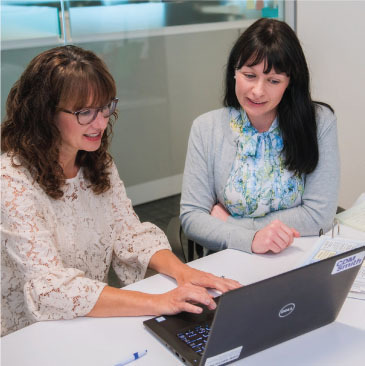November/December 2017
Communities: Private Practice
Six Skills for Building a Compelling Personal Brand
BY KARL FELDMAN
 As engineers progress in their careers, they may find that growth demands an entirely different, and perhaps unfamiliar, skillset. Engineers who promote their personal brand find greater success in their career path while also generating more business for their firm. Showcasing your successes and demonstrating expertise in your subject matter can be powerful ways to attract new clients.
As engineers progress in their careers, they may find that growth demands an entirely different, and perhaps unfamiliar, skillset. Engineers who promote their personal brand find greater success in their career path while also generating more business for their firm. Showcasing your successes and demonstrating expertise in your subject matter can be powerful ways to attract new clients.
At every level, service professionals are reaping benefits from being “visible experts,” the name we at Hinge have given to those individuals who have demonstrated mastery of personal branding. Through interviews of more than 1,000 of these experts and their clients, we pinpointed a correlation between personal branding and measures of success.
For example, top-level visible experts were able to charge up to 13 times more than average professionals in their field. Even entry-level visible experts were able to command fees of more than double their field’s baseline rate. Additional benefits included higher-quality clientele, stronger partnerships, and more attention from the media.
If you know that your firm is a leader in its field, make sure that potential clients understand the value you bring to every project. The following six skills can help you develop your personal brand.
1 Demonstrate your literary talent with clear intent.
A foundation of visible expertise is the ability to showcase your writing skills. The key here is to keep your audience in mind. You’re not writing for other engineers, so it’s important to avoid jargon-laden articles and focus on clear, easy-to-understand prose. Connect with your audience by presenting high-level explanations of solutions. As you develop these skills, you may consider working with a professional editor or writer who can help develop clear content.
2 Blog with frequency to attract a following.
Once you’ve developed a writing style, you need a platform to showcase your work. Blogging remains one of the simplest and most accessible ways to reach a target audience. To develop an engaged audience, it’s important to publish posts at regular intervals. Fortunately, there are easy-to-use publishing tools that can help to ensure your work is online when your audience expects it. Another simple technique is starting with a content calendar to plan your efforts and hold yourself accountable. Write when your schedule allows you to “fill the bucket,” then publish with a predictable (and realistic) rhythm.
3 Understand the basics of search engine optimization.
Search engine optimization is a good strategy to help your target audience find you. Learning the fundamentals of SEO can also help you understand the information your audience is most interested in. The goal is to create content that is relevant to your audience’s needs. There are a number of aspects that go into effective SEO, but one of the most important is learning to research applicable keywords that will attract a significant number of viewers with the right intent.
4 Find the right publications to pitch.
Reaching out to relevant trade publications and industry blogs is another excellent way to get your work in front of potential clients. Industry publications are often hungry for contributed content, so this can become a mutually beneficial relationship. In fact, once you establish a reputation for contributing content, it’s likely that media outlets will seek out your work. As your work appears in other outlets, you’ll find that the outside links to your original posts improve your blog’s SEO.
5 Don’t forget about e-mail.
Another way to expand your audience is to e-mail announcements, blog updates, and other information about your firm’s expertise. Many services exist to help you set up automated mass distribution and track analytics to understand the content to which your audience responds. Some services also allow you to segment e-mails according to your audience’s personal preferences, helping you to meet the specific needs of potential clients.
6 Share your expertise through speaking opportunities.
As you establish a reputation for clearly expressing complex concepts, you may find that new outlets begin reaching out to you to share your expertise. Public speaking is one of the most effective ways to demonstrate expertise. But if the idea of presenting on a national stage seems overwhelming, remember that most visible experts take it step by step. Start by speaking in-house or to a local association, and steadily work your way to a national audience.
Each of these six skills can help elevate your professional brand, but all depend on one common element: expressing yourself in a way that is understandable and relatable. This can be among the most challenging aspects of brand-building, but it’s important to take complex details and explain them in a way that can be understood by any audience. Consider using analogies or real-world examples to simplify technical concepts. This skill takes time to master. Consider tracking your progress through surveys or other feedback tools so you know what works.
It takes time and effort to develop a strong personal brand, but the results can be transformative. As you master these skills, you and your firm can become the trusted guides to which clients turn when there’s a question or complex need.
Karl Feldman is a partner at Hinge Marketing. He guides leading architecture, engineering, and construction clients through the complexities of research, marketing strategy, brand building, and website development.


 Volunteering at NSPE is a great opportunity to grow your professional network and connect with other leaders in the field.
Volunteering at NSPE is a great opportunity to grow your professional network and connect with other leaders in the field. The National Society of Professional Engineers (NSPE) encourages you to explore the resources to cast your vote on election day:
The National Society of Professional Engineers (NSPE) encourages you to explore the resources to cast your vote on election day:






